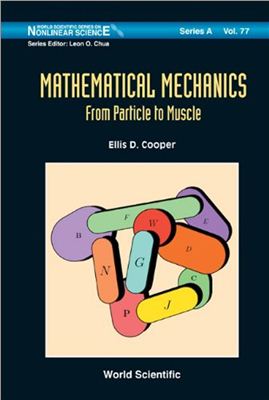World Scientific Publishing Company, 2011. - 392 pages.
This unprecedented book offers all the details of the mathematical mechanics underlying mode modeling of skeletal muscle contraction. The aim is to provide an integrated vision of mathematics, physics, chemistry and biology for this one understanding. The method is to take advantage of latest mathematical technologies - Eilenberg-Mac Lane category theory, Robinson infinitesimal calculus and Kolmogorov probability theory - to explicate Particle Mechanics, The Theory of Substances (categorical thermodynamics), and computer simulation using a diagram-based parallel programming language (stochastic timing machinery). Proofs rely almost entirely on algebraic calculations without set theory. Metaphors and analogies, and distinctions between representational pictures, mental model drawings, and mathematical diagrams are offered.
AP level high school calculus students, high school science teachers, undergraduates and graduate college students, and researchers in mathematics, physics, chemistry, and biology may use this integrated publication to broaden their perspective on science, and to experience the precision that mathematical mechanics brings to understanding the molecular mechanism vital for nearly all animal behavior.
This unprecedented book offers all the details of the mathematical mechanics underlying mode modeling of skeletal muscle contraction. The aim is to provide an integrated vision of mathematics, physics, chemistry and biology for this one understanding. The method is to take advantage of latest mathematical technologies - Eilenberg-Mac Lane category theory, Robinson infinitesimal calculus and Kolmogorov probability theory - to explicate Particle Mechanics, The Theory of Substances (categorical thermodynamics), and computer simulation using a diagram-based parallel programming language (stochastic timing machinery). Proofs rely almost entirely on algebraic calculations without set theory. Metaphors and analogies, and distinctions between representational pictures, mental model drawings, and mathematical diagrams are offered.
AP level high school calculus students, high school science teachers, undergraduates and graduate college students, and researchers in mathematics, physics, chemistry, and biology may use this integrated publication to broaden their perspective on science, and to experience the precision that mathematical mechanics brings to understanding the molecular mechanism vital for nearly all animal behavior.

